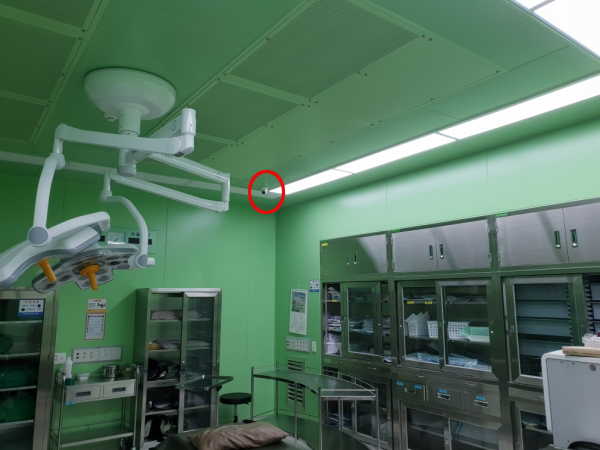Starting next month, Ansung Hospital, located in southern Gyeonggi Province will operate closed circuit (CCTV) surveillance cameras inside operating rooms to check on possible medical malpractice and eradicate the so-called ghost surgery.

Ghost surgery refers to a situation where a hospital changes a patient's surgeon without the consent of the patient.
The installment comes after Governor Lee Jae-Myung said through his Facebook page that the provincial government plans to operate CCTVs at six hospitals in Suwon, Uijeongbu, Paju, Icheon, and Pocheon, until 2019 after a test run at Ansung Hospital.
"The operating room is completely sealed off from the outside, and the surgery takes place while the patient is unconscious," Governor Lee said in his SNS post. "Cases of human rights abuse in such situations make other patients frustrated and worried."
Supporters of the move praised Lee’s decision claiming that it is an appropriate response to a recent string of medical accidents and abuses in operating rooms.
“Consumers and patient groups have been demanding the installation of CCTV in the operating room to prevent crimes fundamentally and to restore patient and public confidence in the medical professionals,” the Korea Alliance of Patients Organizations (KAPO) said. “We welcome the decision to install CCTV in the operating room at hospitals affiliated with Gyeonggi Provincial Medical Center.”
On the occasion of the decision, the National Assembly and the government should take legislative and administrative measures to eradicate ghost surgeries, the organization went on to say.
A management system is also needed to keep hospitals from altering or viewing such recording, it added.
“The legislation should include contents that strengthen the management supervision system so that the images taken by CCTV installed at the medical institutions cannot be viewed or modified without permission,” the group noted.
Doctors' groups, however, strongly opposed the plan and called the provincial government for an immediate withdrawal of the legislation.
“The installation of operating room CCTV makes it impossible to protect the human rights and personal information of the patients as well as the human rights of medical practitioners,” the Korean Medical Association said in a statement. “If the trial operation is enforced, we will use all possible means to respond strongly against the legislation.”
The doctor group stated that similar legislation did not pass the National Assembly for the same reason in the past.
“The 19th National Assembly also failed to enact the amendment, which mandates the installation of CCTV in the operating room, due to such problems,” the association said.
The KMA criticized that if the government plans to enact the new regulation under the pretext of protecting the rights of the people, they should first install the same CCTV where policies for the people are made such as the government-run agencies and the National Assembly.
Doctors themselves expressed concerns over the new legislation.
“There is an expression among the surgeons that their hands would ‘tremble’ if they feel conscious about something other than the operation itself,” a high-ranking member of the Korean Society for Thoracic and Cardiovascular Surgery told Korea Biomedical Review, asking to remain anonymous. “Doctors may not be able to provide the best results to the patient if they are aware of the CCTV as their hands might ‘shake.’”
The official also noted that when doctors perform a challenging operation, it is essential for them not to be conscious of anything other than the surgery and make quick decisions with the staff.
“If they have to think about being filmed constantly, however, they might take defensive measures, which in turn can harm the patient,” he stressed.
Despite such controversies from both sides, the Gyeonggi Province government plans to go ahead with its plans. The provincial administration plans to set aside 44 million won ($39,000) of its budget to purchase and install the CCTV systems at the six medical institutions.

